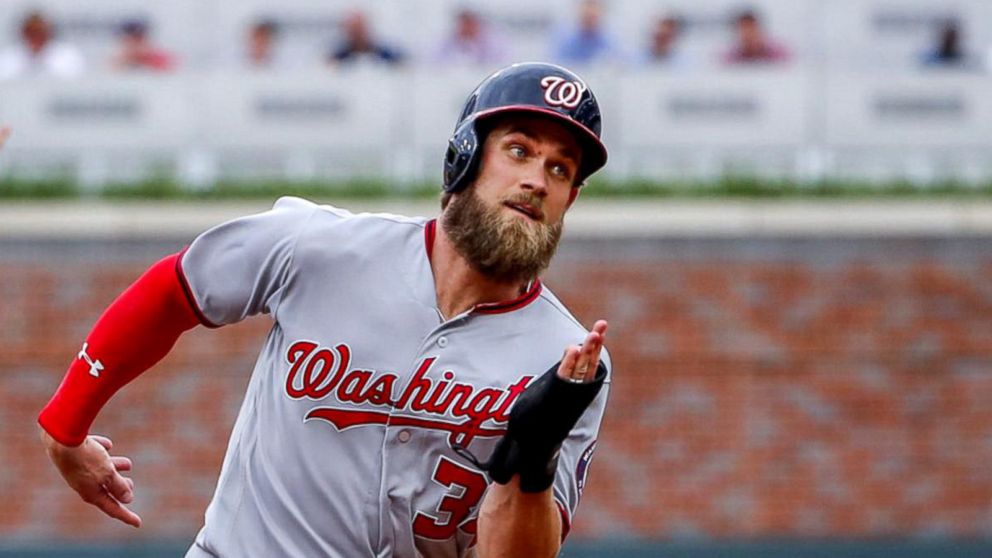The Philadelphia Phillies and star outfielder Bryce Harper on Thursday reached a record free-agent agreement in terms of total dollars ($330 million) and years (13). After waiting 123 days since the World Series ended, Harper breaks the mark set just days earlier by Manny Machado. The previous open-market record — Alex Rodriguez’s free-agent contract for $275 million deal with the Yankees on Dec. 13, 2007 — stood for 11 years until this winter.28
But Harper’s deal falls short in terms of annual average value ($25.4 million). For instance, Rodriguez’s mega deals signed in 2007 and 2001 each had greater average values, and offseason speculation expected that Harper might command more than $30 million per season.29 There is no opt-out clause in the deal, but there is a no-trade clause. Given the deal’s less-than-expected annual average value and Harper’s far-longer-than-expected wait on the open market, the contract suggests that the baseball industry didn’t quite know what to make of Bryce Harper.
The good news for the Phillies is that Harper should help them immediately. Based on 100 simulations run for FiveThirtyEight by Out of the Park Developments, Harper will improve the Phillies from an 80.2-win team in 2019 to an 86.1-win team, though the computer forecasts still had Philadelphia missing the postseason. Harper caps an aggressive offseason for the Phillies, who traded for catcher J.T. Realmuto and shortstop Jean Segura and added notable free agents Andrew McCutchen and David Robertson to a young core led by ace pitcher Aaron Nola and slugger Rhys Hoskins.
But what’s troubling for the Phillies, who are now committed to Harper through his age 38 season in 2031, is that there’s a good chance that Harper has already played his best baseball.
Harper was on the cover of Sports Illustrated in 2009 at age 16, dubbed the “most exciting prodigy since LeBron.” A year later, he was the No. 1 overall pick in the draft. He debuted as a 19-year-old in 2012 and won rookie of the year. In 2015, he posted a season of 10 wins above replacement and was named as the National League MVP. Since he reached the majors in 2012, he’s 20th in position player WAR, and he owns a .900 OPS (on-base plus slugging). In many ways, he’s lived up to the hype.
But seven seasons into his career, we’re not exactly sure what type of player Harper is. While he’s shown stretches of brilliance, volatility in performance has been his most consistent trait.
This has led to an unusual career trajectory to date.
He’s one of only 15 position players 25 and younger to own a 10-WAR season, according to Baseball-Reference.com. The rare company includes Ted Williams, Mike Trout, Willie Mays, Lou Gehrig and Cal Ripken Jr. But he’s had just the one elite-level season.30 His other campaigns have had a range of outcomes, from 1.1 to 5.1 WAR. Even within seasons, he’s had dramatic peaks and valleys. Last year, for instance, he hit .214 with an .833 OPS in the first half but was a star in the second half when he hit .300 with a .972 OPS.

Injuries have played a role in this. Harper has played fewer than 120 games in three of his seven years in the majors, and those partial seasons have also limited his ability to rack up WAR, which is a cumulative stat that rewards just showing up for work.
FiveThirtyEight examined all players in MLB history who have had one season of 8 or more WAR — but only one — before turning 26, and then we studied the trajectory of those players’ careers. There are 32 such players in MLB history, including three other than Harper who are still active: Aaron Judge, Matt Chapman (who hasn’t played his age 26 season) and Evan Longoria. Of the 28 players who are no longer active, 17 never produced another 8-plus WAR season after their age 25 season.
The historical players studied peaked at age 24 (6.6 WAR) and 25 (6.5 WAR), then they declined steadily. A player’s peak is often earlier than conventional wisdom would expect. Jeff Zimmerman at FanGraphs found that while the average ballplayer peaks at age 27, good players peak at either 25 or 26 years old.
While there are exceptions like Adrian Beltre and Henry Aaron, who had some of their best years later in their careers, the best baseball happens early for many excellent players. That doesn’t mean that Harper (or Machado, for that matter) can’t be a star-level player regularly, but history is betting against him becoming a consistent MVP presence like Mike Trout. Baseball may not quite know what Bryce Harper is, but the Phillies are going to find out.
Neil Paine contributed research.
From ABC News:
